必修3 U1grammar
必修三 Unit1 Grammar
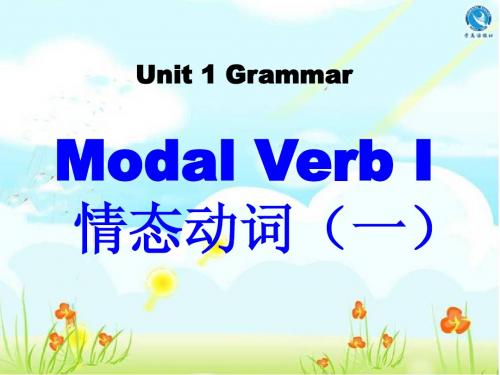
2. could的主要用法是: 的主要用法是: 的主要用法是 A. could 是can的过去式 表示与过去 的过去式, 的过去式 有关的能力和推测: 有关的能力和推测 eg. We all knew that the young man couldn’t be a doctor. B. could可以代替 表示请求, 但语 可以代替can表示请求 可以代替 表示请求 气较can客气、委婉: 客气、委婉 气较 客气
may和might 和
may 常用来表示: 常用来表示: A. 表示请求、允许: 表示请求、允许: 较为正式: 比can较为正式 较为正式 eg. May I come in? You may go now. B. 表示说话人的猜测 “也许” “可 表示说话人的猜测: 也许 也许” 通常只用于肯定句和否定句中。 能”: 通常只用于肯定句和否定句中。
Unit 1 Grammar
Modal Verb I 情态动词( 情态动词(一)
什么是情态动词? 什么是情态动词? (Modal Verbs) 情态动词表示说话人的某种 感情或语气, 感情或语气,对某一动作 或状态的某种态度。 或状态的某种态度。 表示“需要、可以、 表示“需要、可以、 必须、应当” 必须、应当”等。
8. You ______ be hungry already — you had lunch only two hours ago! A. wouldn’t B. can’t C. mustn’t D. needn’t 9. Although this ______ sound like a simple task, great care is needed. A. must B. may C. shall D. should
高中英语人教版必修3 Unit1 GRAMMAR

GRAMMAR情态动词(一)【观察】请仔细观察下列句子中情态动词的用法,并归纳总结。
1. ①Even top students can make mistakes in exams.②Anna may know Tom’s address.③If you’re not careful, you could get into trouble.④Do you think Mr. Smith might be here on time?⑤—It must be our headmaster.—No, it can’t be him. He has gone to Beijing. It may be Mr. Zhang.⑥The rescue team should arrive by 5 o’clock this afternoon.2. ①She can speak five languages.②I couldn’t get tickets; they were sold out.3. ①You can have my seat. I’m going now.②Could I have a drink of water, please?③—May I smoke here?—Yes, of course.④Will / Would you please lend me your car tonight?⑤Shall we go out and have a walk after dinner?⑥Shall Tom go there with me tomorrow?4. ①Ask, if you will, who the owner is.②I would ask such questions when I was at school.5. ①You shall be punished if you break the rule.②Tell her that she shall have the bike tomorrow.6. ①We should take good care of our children.②You should give up smoking and drinking.7.①All passengers must wear seat belts.②You mustn’t move any of the books in my bag.【自我归纳】1. can / could, may / might, must / can’t, should都可表示可能性。
必修3第一单元Grammar,课文学案

必修3第⼀单元Grammar,课⽂学案第五课时语法学案--- 情态动词(I)(Modal verbs)学习⽅法learning method:根据所给例句发现情态动词所表⽰的不同语⽓,从⽽在不同的语境下学会使⽤适当的情态动词。
Step I 情态动词概述1.情态动词本⾝具有词义,表⽰主语或说话⼈的语⽓或对事物的态度。
但它不能单独作谓语动词,只能和⾏为动词或系动词连⽤,构成谓语。
2.情态动词都没有⼈称和数的变化。
常见的情态动词有:Step II Discovering useful structuresFind the sentences in the reading passage that use modal verbs. Underline them.Step III summing up总结⼏个主要情态动词的⽤法:学法指导:从下⾯的例句和意思总结出情态动词的不同⽤法切记:⼀定要先认真研读例句和汉语意思1.can 和could 的⽤法(1) 表⽰有“能”,“会”的意思。
She can speak English.The young man can’t carry the big stone.(2) 表⽰允许。
常译为“可以”(could⽐can语⽓更委婉客⽓)。
Can I help you?You can go now.But he can’t go.Could you do me a favour?注意:以上三句中的could不表过去,could和can没有时间上的差别。
(3) 表⽰,意思是“可能”,“也许”,“或许”(主要⽤于或)---- Can she be in the reading-room?---- No,she can’t be in it.---- Where could(can)he be now?----He could go to the cinema.(could⽐can可能性更⼩)※Can和be able to 的区别〔Eg: I haven’t been able to drive a car.We will be able to finish the task soon. 〕2.may和might的⽤法(1)表⽰回答⽤或〕You may go now.He said that I might use the telephone.---- May l watch TV after supper?---- Yes,you may/can./No,you mustn’t/can’t.(2)表⽰She may come tomorrow.He might be English.(3)may⽤于祈使句中表⽰。
人教课标版高中英语必修3Unit1_Grammar_公开课课件(一)
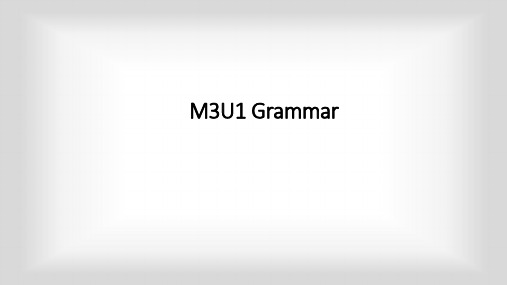
must
can
could
may
might
What's the function of these modal verbs?
To indicate a degree of p_o_s_si_b_il_it_y_ p_ro_b_a_b_i_li_ty_ c_e_r_ta_in_t_y__.vsCrime Scene
Conan: The criminal must be a man, because the bloody foot print belongs to a male.
Sherlock: The criminal might not be a man, because a female might have worn a man’s shoes on purpose.
—Excuse me. Is this the right way to the park? —Sorry, I am not sure. But it ________.
—There were already five people in the car, but they managed to take me as well. —It ____ a comfortable journey.
Example: It’s almost certain that Amy just broke up with her boyfriend. It’s unlikely that Amy and that man will have a happy ending.
Fill in the blanks with one or two words to express the same meaning.
必修3unit1 grammar
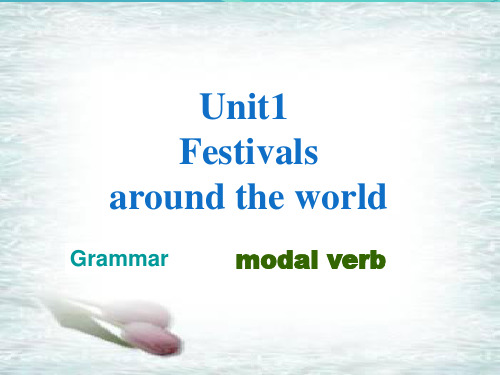
4. satisfy
vt. 使满意
Nothing satisfies him; he is always complaining. The government tries its best to satisfy people’s needs.
satisfaction n. 满意、令人满意的人/物 satisfied (人)满意的 satisfying/ satisfactory令人满意的 The teacher was satisfied with his satisfying/ satisfactory answer.
5. harm : 1) n. damage, injury 损坏,伤害 do harm to …= harm Smoking does harm to our health. do more harm than good弊大于利 If we try to solve the problem in this way, it will do more harm than good. • vt. cause harm to The event harmed his reputation. come to harm 受到伤害 I will go with her to make sure she comes to no harm. 我要跟她一同去以免她受到伤害。
Must , can/could, may/might 的用法
must
1.Must 表示推测时, 只能用于肯定句。 这个电脑肯定出了问题。 There must be something wrong with the computer.
你努力学了一整天, 一定累了吧 You have worked hard all day. You must be tired.
人教版高中英语必修3 Unit1 Grammar 优秀教学设计

Unit1 Grammar 教学设计Period 4语法专题课Modal Verbs (I)设计意图This is the last period of this unit, aiming to help students get a basic knowledge of the grammar in this unit. The emphasis of this period is mainly placed on understanding and using the grammar. Therefore, teachers should create a relatively real context to present enough sentences for students to draw a conclusion about the rule of modal verbs. In the meantime teachers should offer more opportunities for students to practice. Exercises designed ought to be simple and easy to operate, which are connected with their daily life to make it easy to understand.教学目标1. To master the basic usage of modal verbs, such as can, may, must, should, shall, etc.2. To learn to use the modal verbs in the real situation through self-study and practice. 教学重点Enable students to master the usage of the modal verbs, such as can, may, must, should, shall, etc.教学难点To guide students to use the modal verbs in real situations.教学过程Task 1 Lead-inT: Hello, everyone! Please look at the following sentences and try to find what they have in common. (The sentences from the text. )1. Most ancient festivals would celebrate the end of cold weather.2. For the Japanese festival Obon, people should go to clean graves and light incense in memory of their ancestors.3. Festivals can also be held to honour famous people.4. These carnivals might include parades, dancing in the streets day and night. Modal verbs are used in the sentences.(设计意图: 通过课文句子导入新课,让学生初次体会情态动词的使用语境,同时带着问题进入课堂,激发学生兴趣。
人教课标版高中英语必修3Unit1_Grammar_名师课件(三)

I hope the advice can be helpful. May you succeed!
Yours, Group __from Class 8
Brain-storming
Ways to lose weight and keep fit
1. May you succeed! 2. May I know your ideas? 3. He may/might be an American, but I am not sure. 4. “ You may have 3 minutes to discuss in groups”, said Mrs Nian.
• In order to keep fit, wem__u_s_t_/s_h__o_u_ld_/_o_u_g_h_t__to_do
exercise regularly and eat a balanced diet .It _m__u_s_t/_s_h_o_u_l_d_ include three kinds of food: the
3.Evaluation
How are things going in your college life?
wer(55241899) 2013-3-11 21:37:14
A good news for you. I__c_a_n__(can/could)speak nglish fluently now. You know, in the middle hool, I even__c_o_u_ld__(can’t/couldn’t) pronounce ords well.
译林版高中英语必修第3册 U1L3 Grammar and usage

5. The ticket had a strict no-transfer policy, but since passport information was not required when booking, any Canadian Elizabeth Gallagher can use it. (2017全国III, 完形填空)
(2019北京, 阅读理解A)
Do you want to explore new cultures, meet new people and do something worthwhile at the same time?
Has it been a while since your last visit to a public library? If so, you may be surprised to learn that libraries have changed for the better.
3. But when he finally reached her, the woman flooded him with questions: “Who are you? What antique shop?” (2019浙江, 阅读理解A)
are you from
4. We’ve all been there: in a lift, in line at the bank or on an airplane, surrounded by people who are, like us, deeply focused on their smart phones or, worse, struggling with the uncomfortable silence.
外研版高中英语必修3Module1_Grammar_名师课件(一)

1.His house was broken by a thief last night.
into
2.When we got to the top of the mountain, the
sun had already been risen.
3.The boy was made cry by his sister.
5. Will our school hold the sports meeting next week?
Will the sports meeting be held next week?
6. The nurse is taking care of the babies. The babies are being taken care of (by the nurse).
2.Finish the exercises in your workbook.
Change the sentences into passive voice
1. He sold the magazines in that shop. The magazines were sold (by him ) in that shop.
2. We were cleaning the classroom this time yesterday. The classroom was being cleaned this time yesterday. 3. He hadn’t finished his homework when I got home. His homework had not been finished when I got home. 4. We clean the classroom every day. The classroom is cleaned by us every day.
必修三 unit1 Grammar 课件

2. 表示“许可”,可与may 换用。 3. 表示推测,意为“可能”“或许”
4. 表示“请求” “允许”(表请求时,口语中常用 could 代替 can 使语气更委婉 )
1) Some of us can use the computer now. 2) I though what he said could not be true. 3) Could I use your dictionary? 4)You can go home now.
2. may 与might
2. 表示可能性。 意为“或许,可能” 。might 比 may可能性小。 Eg: 1) They may be in the library now. 2)May I watch TV after supper?
1. 表示征询对方“许可”或“请求”,意为“可以
3. will 与would
1. 表示义务或强烈的劝告,意为“必须”“应该” 2. 表推测,用于肯定句,意为“一定”“务必”。 3. 回答 must 所在的一般疑问句时,否定回答用 “needn’t”, “don’t have to”.
Eg: ---Must we finish the work tomorrow? ---No, you needn’t/ don’t have to, but you must finish it in three days.
4. should
1. 表劝告、建议。 意为”应该、应当”。 2. 用于表推测。 意为 “可能、该…” Eg: 1)You should keep your word. 2)It’s 7 o’clock, he should be at home.
5. shall
shall的主语是第二、三人称的陈述句, 表示说话人的允诺、警告、命令等语气。
必修三Unit1Grammar教案
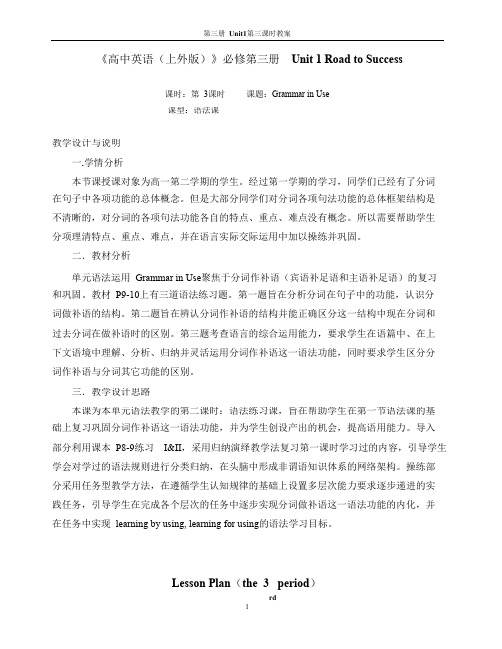
《高中英语(上外版)》必修第三册Unit 1 Road to Success课时:第3课时课题:Grammar in Use课型:语法课教学设计与说明一.学情分析本节课授课对象为高一第二学期的学生。
经过第一学期的学习,同学们已经有了分词在句子中各项功能的总体概念。
但是大部分同学们对分词各项句法功能的总体框架结构是不清晰的,对分词的各项句法功能各自的特点、重点、难点没有概念。
所以需要帮助学生分项理清特点、重点、难点,并在语言实际交际运用中加以操练并巩固。
二.教材分析单元语法运用Grammar in Use聚焦于分词作补语(宾语补足语和主语补足语)的复习和巩固。
教材P9-10上有三道语法练习题。
第一题旨在分析分词在句子中的功能,认识分词做补语的结构。
第二题旨在辨认分词作补语的结构并能正确区分这一结构中现在分词和过去分词在做补语时的区别。
第三题考查语言的综合运用能力,要求学生在语篇中、在上下文语境中理解、分析、归纳并灵活运用分词作补语这一语法功能,同时要求学生区分分词作补语与分词其它功能的区别。
三.教学设计思路本课为本单元语法教学的第二课时:语法练习课,旨在帮助学生在第一节语法课的基础上复习巩固分词作补语这一语法功能,并为学生创设产出的机会,提高语用能力。
导入部分利用课本P8-9练习I&II,采用归纳演绎教学法复习第一课时学习过的内容,引导学生学会对学过的语法规则进行分类归纳,在头脑中形成非谓语知识体系的网络架构。
操练部分采用任务型教学方法,在遵循学生认知规律的基础上设置多层次能力要求逐步递进的实践任务,引导学生在完成各个层次的任务中逐步实现分词做补语这一语法功能的内化,并在任务中实现learning by using, learning for using的语法学习目标。
Lesson Plan(the 3 period)rdLearning Objectives:By the end of the period, the students are expected to:1. have the ability of classifying and summarizing grammar rules of -ing / -ed forms as complements;2. form the network of -ing / -ed forms as complements in mind so as to distinguish them from other functions of -ing / -ed forms;3. skillfully apply -ing / -ed forms as complements in listening, reading and writing.Learning Procedures:Step I. Revision (Interactive activity)*T: Help the students recall and classify what they learned in the first period of Grammar in Use with the help of Exercise I & II on P 8-9.*Ss: Recall the grammatical rules of -ing / -ed forms used as complements by category.I. -ing form used as complements:feel / hear / listen to / see / watch / look at / notice / observe ... + O. + doing (O. C.)S.+ be felt / heard ... + doing (S. C.)discover / find / smell / catch ... + O. doing (O. C.)S. + be + discovered ... + doing (S. C.)get / have / keep / leave / send / set / start ... + O. doing (O. C.)with + O. + doing (O. C.)II. -ed form used as complements:see / hear / watch / find / feel / consider ...+ O. + done (O. C.)S.+ be seen ... + done (S. C.)get / have / keep / leave / make ... + O. + done (O. C.)declare / like / need / order / want / wish ... + O. + done (O. C.)with + O. + done (O. C.)Note: After working non-stop for twenty hours, he went to bed tired and hungry. (O. C.) The athlete went away quite satisfied with the result of the match. (O.C.)Step II. PracticeI. Identify - ing /- ed forms as complements in the lyrics (Task 1)*T: Play the song “Those Sweet Words” and ask students to identify - ing /- ed forms as complements in the lyrics while enjoying the melody. And then focus on the functions of -ing / -ed forms in “Iknow I saw you saying it.” and “I just h ave to hear t hose sweet words s poken like a melody.” and the meanings of the two sentences.*Ss: Identify - ing /- ed forms as complements and translate the two sentences into Chinese.Those Sweet WordsBy Norah JonesWhat did you sayI know I saw you saying itMy ears won't stop ringingLong enough to hearThose sweet wordsWhat did you sayAnd now the dayThe hour hand has spunBefore the night is doneI just have to hearThose sweet wordsSpoken like a melodyAll your love...II. Apply -ing / -ed forms as complements in individual sentences. (Task 2)*T: Ask students to identify the structure of -ing / -ed forms as complements in the following sentences and then fill in the blanks with proper forms of the verbs given in the box. Call students’attention to the differences between -ing forms as complements and -ed forms as complements.*S: Read the sentences silently and underline the structure of -ing / -ed forms as complements in each sentence and then fill in the blanks with -ing forms or -ed forms based on grammar rules of the differences between -ing forms as complements and -ed forms as complements.III. Apply -ing / -ed forms as complements in a passage. (Task 3)*T: Ask students to read a short passage and fill in the blanks with the -ing / -ed forms of the verbs given in the box. Then circle the ones that are used as complements. Call students’ attention to the differences between -ing / -ed forms as complements and -ing / -ed forms for other functions.*S: Read the short passage silently and circle the structures of -ing / -ed forms as complements in the passage and then fill in the blanks with -ing forms or -ed forms based on grammar rules of the differences between -ing / -ed forms as complements and -ing / -ed forms for other functions.IV. Apply -ing / -ed forms as complements in writing sentences. (Task 4)*T: Ask students to read each sentence in Chinese carefully and make out which category of -ing / -ed forms as complements fits the contexts best based on the given word in the brackets. And then translate the whole sentence into English.*S: First, make out and write down the proper structure of -ing / -ed forms as complements. Then, translate the whole sentence into English.。
高中英语牛津译林版必修三UNIT1GRAMMAR课件-
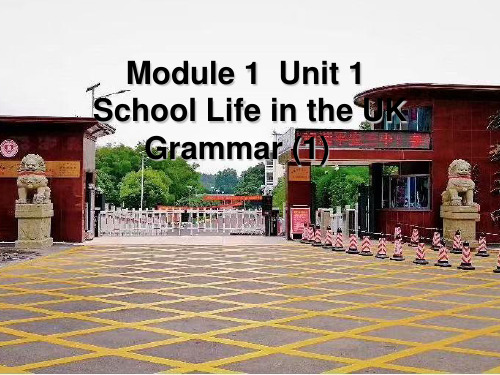
things
Conclusion
which/that people/thing subject/object
Conclusion
Relative pronouns used in attributive clauses
第三关 Pratice
一. 用关系代词填空
1.The girl __w_h_o_/_th_a_t__is standing next to our teacher is her daughter.
7. I used to study in a classroom ___w__h_o_s_e____windows were all broken.
试着找出下列句中的先行词,引导词和定语从句
1. The trees which are on the school campus have lost their leaves. 2. The students whom we saw just now are the best runners in our school. 3. She has a brother whose name I can’t remember. 4. The school where he studied is in Shenzhen.
In attributive clauses ,the antecedent is
as Attribute, we use whose to refer to
________.
people/t
hing
Conclusion
whose people/thing attribute
Paul is an American _w_h_o__s_efull name is Paul William Walker IV. He was affected by his mothewr_h_o__/t_h_a_t__ was a model. Later he became an actor
人教课标版高中英语必修3Unit1_Grammar_公开课课件(二)
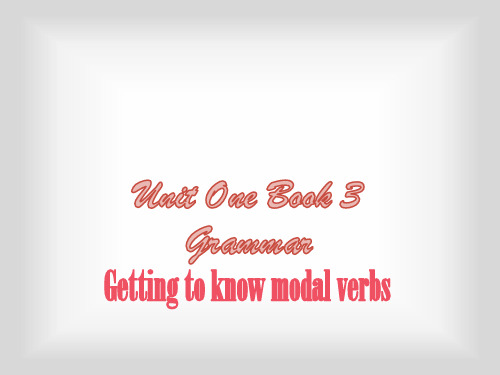
let it out this morning.
时态的表达
1. 本身有过去式 2. 合成构成时态
一般式 情态动词+do 完成式 情态动词+have done 进行式 情态动词+be doing
What have you already known about the modal verbs? 1.概念 情态动词表示说话人的某种感情或语 气,对某一动作或状态的某种态度。 表示“需要、可以、必须、应当”等。
2.使用原则
• 情态动词 + do • 情态动词没有人称,数的变化 • 时态的表达
a. He can speak French. b. He could run two miles when he was five
must
推测用法 把握大 把握小 把握大
注意事项 否定句和疑问句 肯定句和否定句
肯定句
Homework 记 ---记忆今天课堂所 学内容
做 ---完成《课时练》P8-10
Part I
推测用法
can/could 把握大
may/might 把握小
must
把握大
注意事项 否定句和疑问句 肯定句和否定句
肯定句
注意:could/might 语气稍弱。
Conclusion
can/could may/might
must
Part II
独特用法
注意事项
Conclusion
can/could may/might
Getting to know modal verbs
人教版高中英语必修三Unit1Grammar课件

would 比will 更委婉。 例如: ➢Will you come this way, please? ➢Would you open the window?
2020/2/20
shall and should
2020/2/20
will, would, shall, should, must:
➢ 1. We ___m__u_s_tn__’t_ smoke here, because the worker is carrying some
petrol. 表示禁止,不许可
表示建议,命令
➢ 2. It is dangerous. You ___s_h_o_u_l_d__ leave the room immediately.
and see us more often.
表示建议
➢ 8. Why don’t you try on this dress? It ____w_i_l_l __ look nice on you.
表示将会,一定会
2020/2/20
must and can’t
➢ must 用来表示“命令”、“推测”等含义。 ➢ 1)表示规定、指令 ➢ 表示规定、指令时主要指客观上的法律、条文规定,
if you’ve finished with it? ---- Of course. I’ll give it to you this afternoon. ➢ (agreement) ➢ Thanks for lending me the money, I’ll pay you back on Friday. ➢ (promise)
人教版高中英语必修三 Unit 1Grammar(共49张PPT)

7 It is now a children’s festival, when they can dress up and go…
8 …the children might play a trick on them.
9 Festivals can also be held to honour famous people.
1 Most ancient festivals would celebrate the end of cold weather…
2 Sometimes celebrations would be held after hunters had caught animals.
3 At that time people would starve if food was difficult to find
e.g. The girl can dance very well. B. 表示说话的推测、事物的可能性等:
e.g. Can the news be true? C. 在口语中, can可以表示请求或允许:
e.g. Can I sit here?
can表示“能够”时与短语be able to同义, 但can只用于一般现在时或过去时,而后 者可用于各种时态。另外,can表示个人 有某种能力,而be able to表示某人通过 努力、克服困难做成某事,相当于 succeed in doing sth.;叙述过去事实时, 最好用was / were able to,因为could只表 示过去具有某种能力。
ability, advice, agreement, guessing, past habit, necessity, permission, possibility, prediction, promise, request
- 1、下载文档前请自行甄别文档内容的完整性,平台不提供额外的编辑、内容补充、找答案等附加服务。
- 2、"仅部分预览"的文档,不可在线预览部分如存在完整性等问题,可反馈申请退款(可完整预览的文档不适用该条件!)。
- 3、如文档侵犯您的权益,请联系客服反馈,我们会尽快为您处理(人工客服工作时间:9:00-18:30)。
5.must and can’t
Grammar
modal verb
情态动词有一定的意义,但没有人称和数的 变化,不能独立使用,它和后面的动词构成 谓语.
Zx xk
只作情态动词的
can/could, may/might, ought to, must 可情态可实义的 need, dare/dared 可情态可助动词的 shall/should, will/would 相当于情态动词的 have to, used to, had better, would rather
3.will and would
The Spring Festival is the most fun. The whole family will come for dinner. ( promise; agreement) Often he would dress up like a rich man. (past habit) Would you like to join us for dinner? (request) 注意:would 与 used to 均可表示“过去惯常”,但是 would 常与过去时间状语连用,意为总是,总要;used to 与现在时间相比,意为过去常常,暗示现在已经没有了。 Eg. When he was there, he would go to that coffee shop at the corner after work every day? He used to go to that coffee shop at the corner after work every day, but now he goes to play basketball.
zx xk
4.shall and should
The harvest festival begins on Saturday. We shall be there with our friends. (promise, agreement) When going by plane,you should arrive at the airport at least one hour early. (advice) It’s nearly five o’clock. The taxi should be here soon. (prediction)
2.may and might
May we see the awards for teams? ( permission, request) She might give you some new clothing. (possibility) 注意:1).表示许可时,用于第一人称,指我(们)被允
ห้องสมุดไป่ตู้
1.can and could
Jim can speak English well. (ability) No one could finish the test last week. (ability) The teacher said that we could not leave early. (permission) The hunters are lost. They could starve. (possibility) Could you please show me the way to Beihai Park? (request)
zx xk
对现在的事情进行把握较大的判断时,肯定判断用must+ 动词原形,否定判断用can’t+动词原形。
She must be in the library. She can’t be in the room.
Assignment
1.Practise of WB P42 Ex. 1, Ex 2 and Ex.3 2.Please find out 10 sentences with modal verbs, and try to get their meanings.
When you eat fish you must be careful with the bones. (advice, necessity) Wang Feng wins an award every year. He must be very strong. (guessing) You must be joking. That can’t be true. (guessing)
许做某事;用于其他人称,则指说话者允许主语做某事。
Eg. We might go shopping until dark.(我们被允许) Mother said:”You might go shopping until dark.” ( 说话者允许主语做某事) 2).在用于请求许可时,may可与can/could 互换
